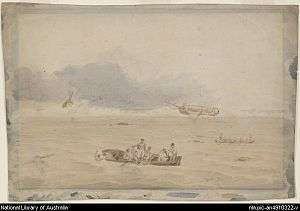Robert Merrick Fowler
Rear admiral Robert Merrick Fowler (1778 – 25 May 1860) was an officer of the Royal Navy notable for his service as the second-in-command to Matthew Flinders on HM Sloop Investigator from 1801 to 1803 and for his involvement in Battle of Pulo Aura in 1804.
Rear admiral Robert Merrick Fowler | |
|---|---|
| Born | 1778 Horncastle, Lincolnshire, England |
| Died | 25 May 1860 Whitchurch-on-Thames, Oxfordshire |
| Allegiance | |
| Service/ | |
| Years of service | 1793–1846 |
| Rank | Rear admiral |
| Commands held | Porpoise, HMS Crocus |
| Battles/wars | Battle of Pulo Aura |
Career

Fowler, born 1778 at Horncastle, Lincolnshire, England joined the Royal Navy in May 1793 as a volunteer. He served as midshipman on Royal William and was promoted to Lieutenant in February 1800.[1]
He was posted to Xenophon (later Investigator) as first lieutenant and second-in-command to Flinders during the years 1801-03. He appointed to command Porpoise which was wrecked off what is now Queensland on the homeward voyage during August 1803. Fowler was exonerated for the responsibility for the shipwreck at court-martial in 1804.[2][3]
In 1804, Fowler and other survivors of the Porpoise joined a British fleet in Canton commanded by Captain Nathaniel Dance heading for the United Kingdom. Fowler distinguished himself in an engagement known as the Battle of Pulo Aura in February 1804 where a numerically superior French squadron under the command of Admiral Linois was repelled at Pulau Aur in what is now Malaysia. As an acknowledgement of his contribution, Fowler received a sword from Lloyd's Patriotic Fund.[4]
He was promoted to Commander in 1804 and was on active service in home waters and West Indies Station during the years 1805-11. He promoted to Post captain in 1811. Fowler was promoted to rear admiral in 1846[5][6] and vice-admiral on the Retired List in 1858.[7]
Fowler retired to Walliscote House at Whitchurch-on-Thames in Oxfordshire and died in 1860. He was remembered by Flinders in 1802 in the naming of the following geographical places in South Australia - Fowlers Bay and Point Fowler.[8]
.jpg)
See also
Notes
- Brown (2000), p.489
- Flinders (1966) [1814], p. 154
- Brown (2000), p.489
- Brown (2000), p.489
- Brown (2000), p.489
- "Naval Promotions". The Sydney Morning Herald. 16 February 1847. p. 2. Retrieved 15 February 2014.
- "No. 22140". The London Gazette. 19 May 1858. p. 2454.
- Brown, Anthony (2007). "The Tangled Fortunes of War: The story of Robert Fowler and Pierre Bernard Milius". Australian Heritage. pp. 34–40. Retrieved 15 February 2014.
See also
- O'Byrne, William Richard (1849). . . John Murray – via Wikisource.
References
- Brown, Anthony J. (Anthony Jarrold) (2000), Ill-starred captains : Flinders and Baudin, Crawford House Pub, ISBN 978-1-86333-192-0
- Flinders, Matthew (1966) [1814]. A Voyage to Terra Australis : undertaken for the purpose of completing the discovery of that vast country, and prosecuted in the years 1801, 1802, and 1803 in His Majesty's ship the Investigator, and subsequently in the armed vessel Porpoise and Cumberland Schooner; with an account of the shipwreck of the Porpoise, arrival of the Cumberland at Mauritius, and imprisonment of the commander during six years and a half in that island. (Facsimile ed.). Adelaide; Facsimile reprint of: London : G. and W. Nicol, 1814 ed. In two volumes, with an Atlas (3 volumes): Libraries Board of South Australia. Retrieved 15 February 2014.